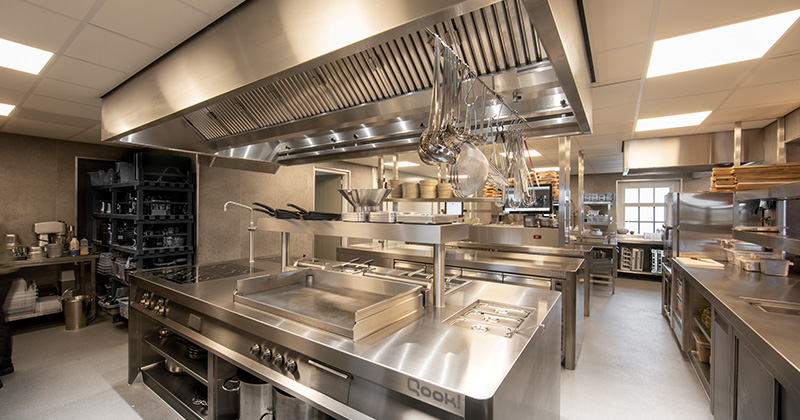Temperature protection: essential for fire safety
One of the biggest risks in catering kitchens is fire risk. This is why temperature protection systems are indispensable. Thermostats and overheat protection prevent appliances from overheating, significantly reducing fire risk. Automatic shutdown switches off appliances when a dangerously high temperature is reached, adding an extra layer of safety.
Mechanical safety: protection against injuries
Mechanical safety in catering kitchens cannot be overlooked. Safety sensors and emergency stop buttons allow users to quickly switch off appliances in case of an emergency. In addition, protective caps and guards ensure that employees do not come into contact with moving parts such as knives or mixers. Non-slip feet and stability contribute to a stable working environment, further reducing the risk of accidents.
Gas safety: preventing gas leaks
In kitchens where gas is used for cooking, flame protection and gas leak detectors are essential. Flame protection shuts off the gas flow when the flame goes out, preventing gas leaks. Gas leak detectors detect and warn of gas leaks, which is crucial for the safety of kitchen workers.
Hygienic safety: preventing contamination
Hygiene is another important factor in catering kitchens. Devices that are easy to disassemble and clean help reduce the risk of bacterial contamination. Using food-safe materials prevents chemical reactions and contamination of food. This contributes to overall food safety and customer health.
Qook! seamless catering kitchens mean there are no cracks and seams for dirt to get in. This contributes enormously to hygienic safety in a kitchen.
Automatic systems and smart technology: advances in safety
Integrating smart technologies into catering kitchens offers numerous safety benefits. Automatic shutdown and timers reduce the risk of fire or overcooking. Temperature and humidity sensors monitor and adjust cooking conditions to ensure optimal safety and quality. These advanced systems not only make the kitchen safer, but also more efficient.
Ventilation and smoke extraction: improved air quality
Good ventilation is essential for a safe and comfortable working environment. Extractor hoods and filters remove smoke, fumes and odours to improve air quality in the kitchen. Automatic fire systems in extractor hoods extinguish fires that may occur in extractor systems, providing an extra layer of protection.
Ergonomic design: reducing physical complaints
Ergonomics plays an important role in the safety and well-being of kitchen workers. Ergonomic handles and controls reduce the risk of injuries caused by repetitive movements or incorrect postures. Adjusting working heights prevents strain and injuries, contributing to a healthier and more productive working environment in your Qook! catering kitchen.
Conclusion
Safety in catering kitchens is a complex but essential aspect of operations. By incorporating the right safety measures, kitchens can not only prevent accidents but also increase efficiency and productivity. At QBTEC, safety and innovation are paramount, resulting in high-quality cooking and frying equipment that meets the highest safety standards.
- Temperature protection: Prevents overheating and fire hazard.
- Mechanical safety: Reduces the risk of injury from moving parts.
- Gas safety: Prevents gas leaks and fire risk.
- Hygienic safety: Ensures clean and safe food preparation.
- Automatic systems: Increase safety and efficiency.
- Ventilation: Improves air quality and fire safety.
- Ergonomic design: Reduces physical complaints and increases productivity.
Would you like to know more about how Qook! can help you make your catering kitchen safer and more efficient? Contact us for more information or a consultation. Our experts are ready to support you in optimising your hospitality operations.

